Vanessa Beeley
19 Apr 2024 | 10:32 am
1. Apartheid Israel - conversation with Fiorella Isabel recently on the ground
Last night I spoke to a dear friend, journalist Fiorella Isabel now based in Russia. Fiorella recently spent time in the Occupied Territories and I speak to her about her first impressions, her experience of Apartheid and life under occupation.
You can follow Fi's work at the following links and on Rumble.
Twitter: https://twitter.com/FiorellaIsabelM
Telegram: https://t.me/fiorellastele
Instagram: https://www.instagram.com/fiorellainmoscow/
Facebook: https://www.facebook.com/fiorellaisabelm
Additionally, you can watch The Convo Couch on Rokfin and YouTube:
The Convo Couch on Rokfin: https://rokfin.com/TheConvoCouch
The Convo Couch on YouTube: https://www.youtube.com/TheConvoCouch
****
Please do consider subscribing to my Substack. Thank you to all those who already do. xx
15 Apr 2024 | 4:46 pm
2. Iran's True Promise Operation
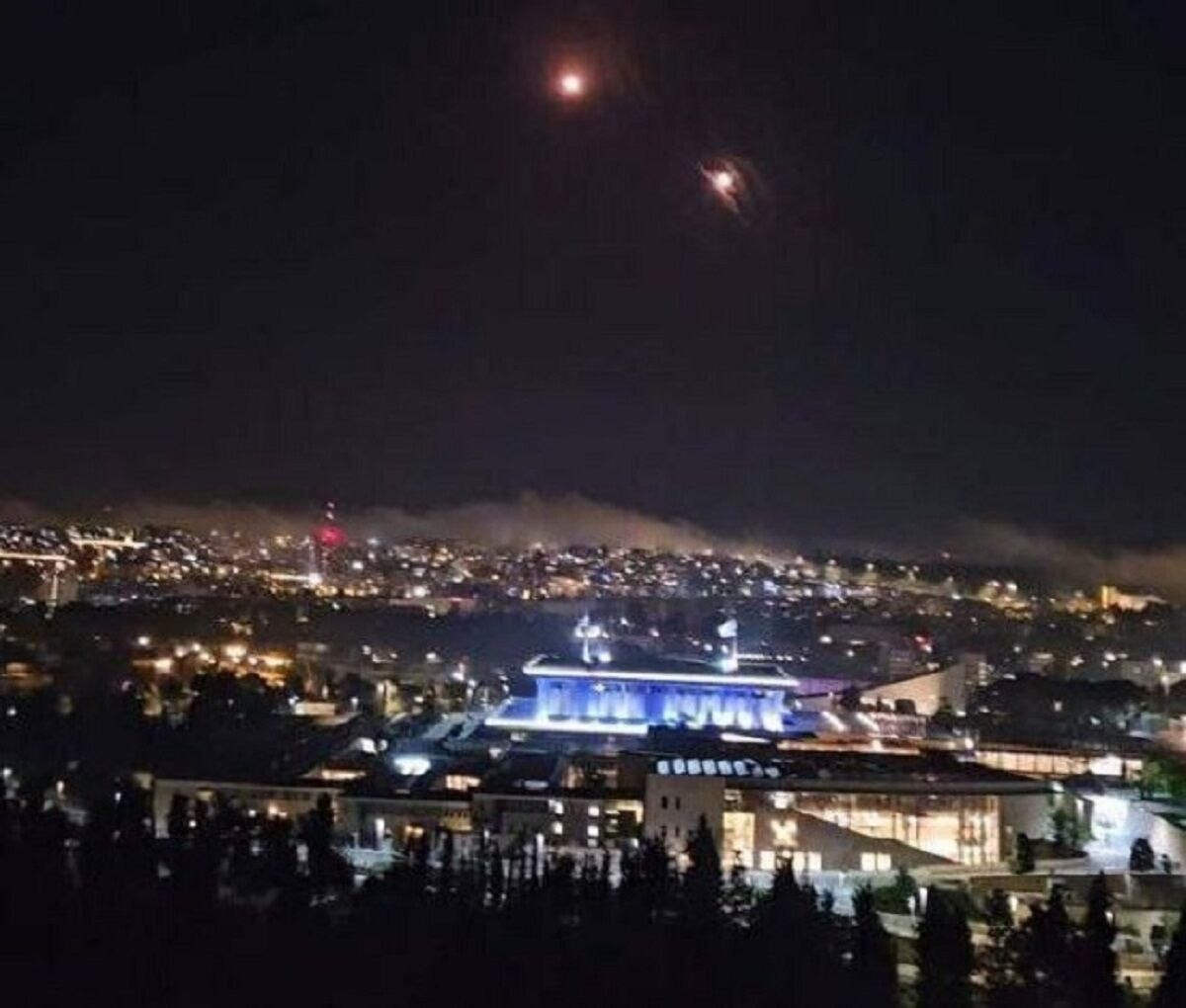
Iranian missiles passing over the Knesset in Occupied Palestine
I do thoroughly recommend watching this UK Column News special episode in full as 90% is in-depth analysis of the Iranian retaliation against Israel's egregious attack on the Iranian Embassy in Damascus more than ten days ago:
Also just an extra - video footage of Iranian launch of cruise missiles just released by Press TV:
****
Please do consider subscribing to my Substack. I am totally dependent on public donations to keep doing the work I do from the region. Thank you, as always, for all those who have already decided to support me. xx
13 Apr 2024 | 3:43 pm
3. A conversation with independent candidate for US Senate, Diane Sare
****
Please do consider subscribing to my Substack for more updates from on the ground in Syria. Thank you for all your support x
13 Apr 2024 | 9:06 am
4. Zionist AI marking civilians for assassination - is it a vision of a future we don't want?
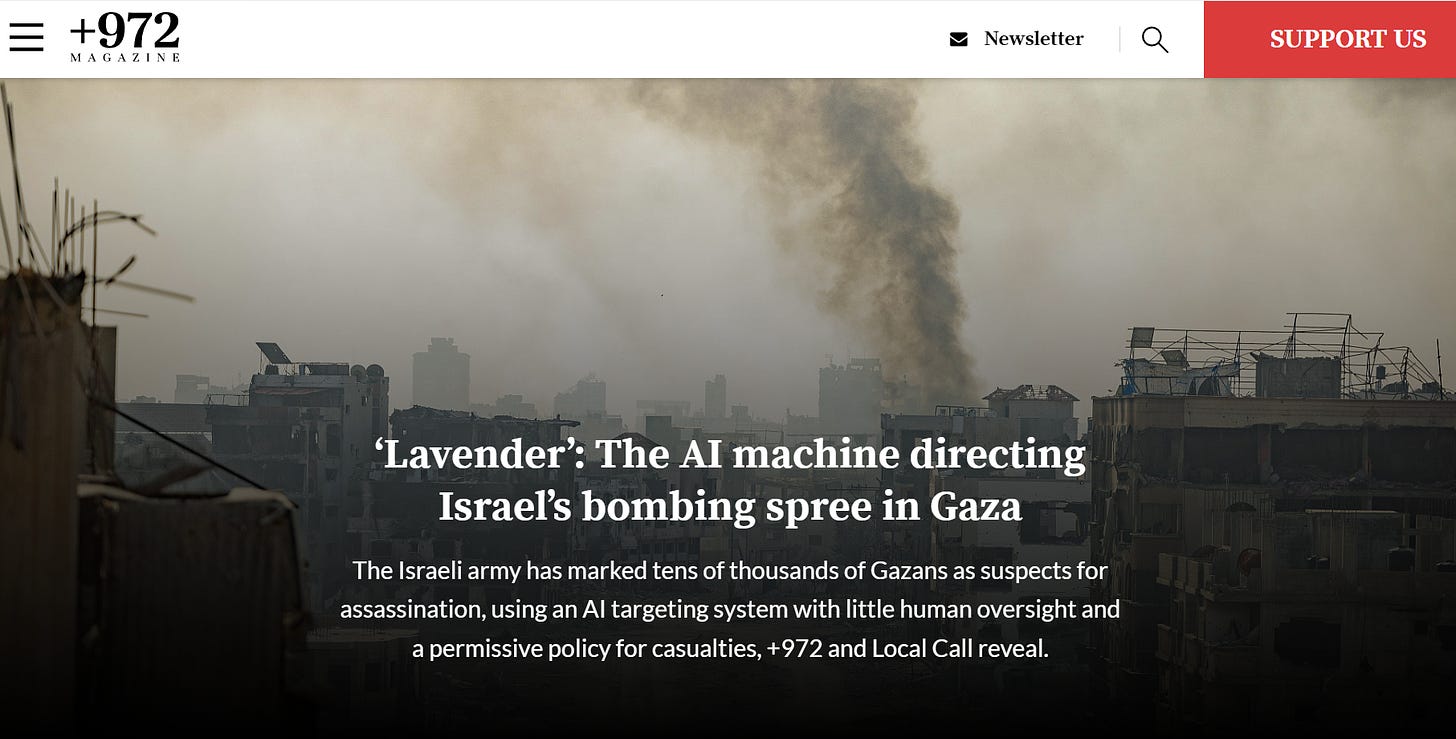
Mike Robinson, Charles Malet and Vanessa Beeley with today's UK Column News.
00:20 Lord Cameron Takes His Sick Mind To Washington
13:05 British Army's Mission To Prepare Gen Z For War
21:08 Israeli Aggression On Iranian Consulate
26:52 Updates And Announcements
29:33 Attacks On Youth: Gender Confusion
37:50 Strasbourg Soup: Climate Change Merges With Human Rights
43:10 AI: Lavender Scanning Populations And Marking Targets
48:49 New Pre-Crime Laws To Fight Protests
54:40 The Inevitable Witch Hunt On Galloway Gets Underway
****
Please do consider subscribing to my Substack. I am entirely reliant upon public donations to keep doing the work I do. To all those already subscribed, thank you so much. x
10 Apr 2024 | 1:04 pm
5. US Intel behind attacks in Moscow, Damascus, Iran
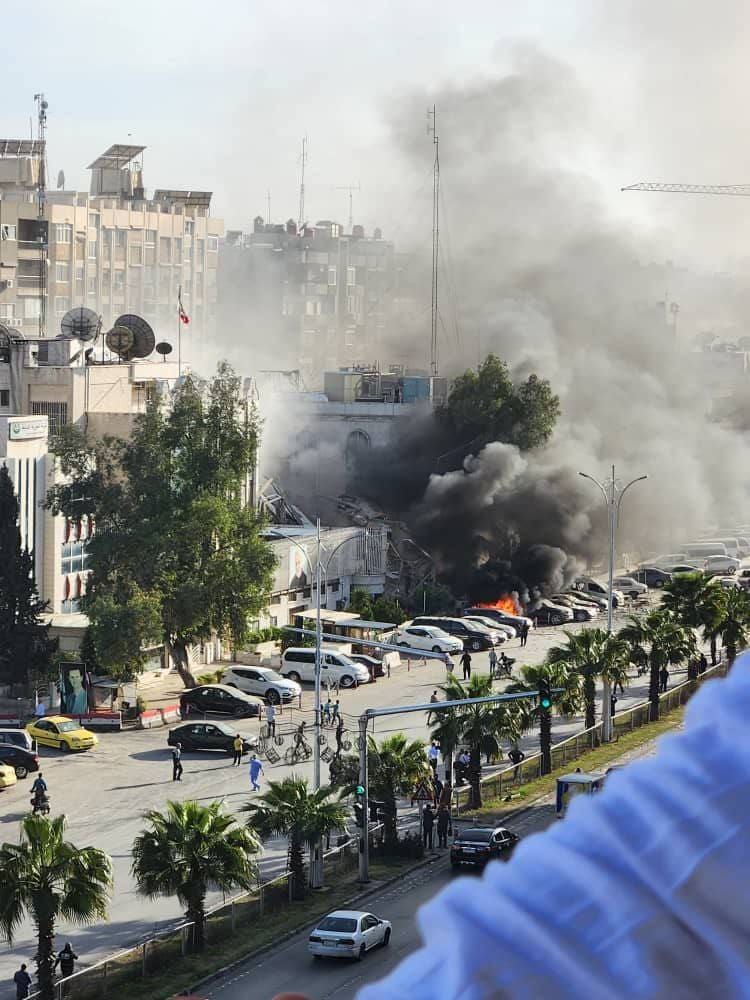
The Israeli attack on the Iranian Embassy in Damascus 10 days ago
Last night I had a great conversation with journalists Fiorella Isabel and Eva Bartlett on the terror attack in Moscow, against the Iranian Embassy in Damascus and the ongoing war expansion by all the Western proxies including Israel. If you prefer to watch on Rumble, the link is here:
****
8 Apr 2024 | 7:17 pm
6. Israel's culture of rape and child abuse
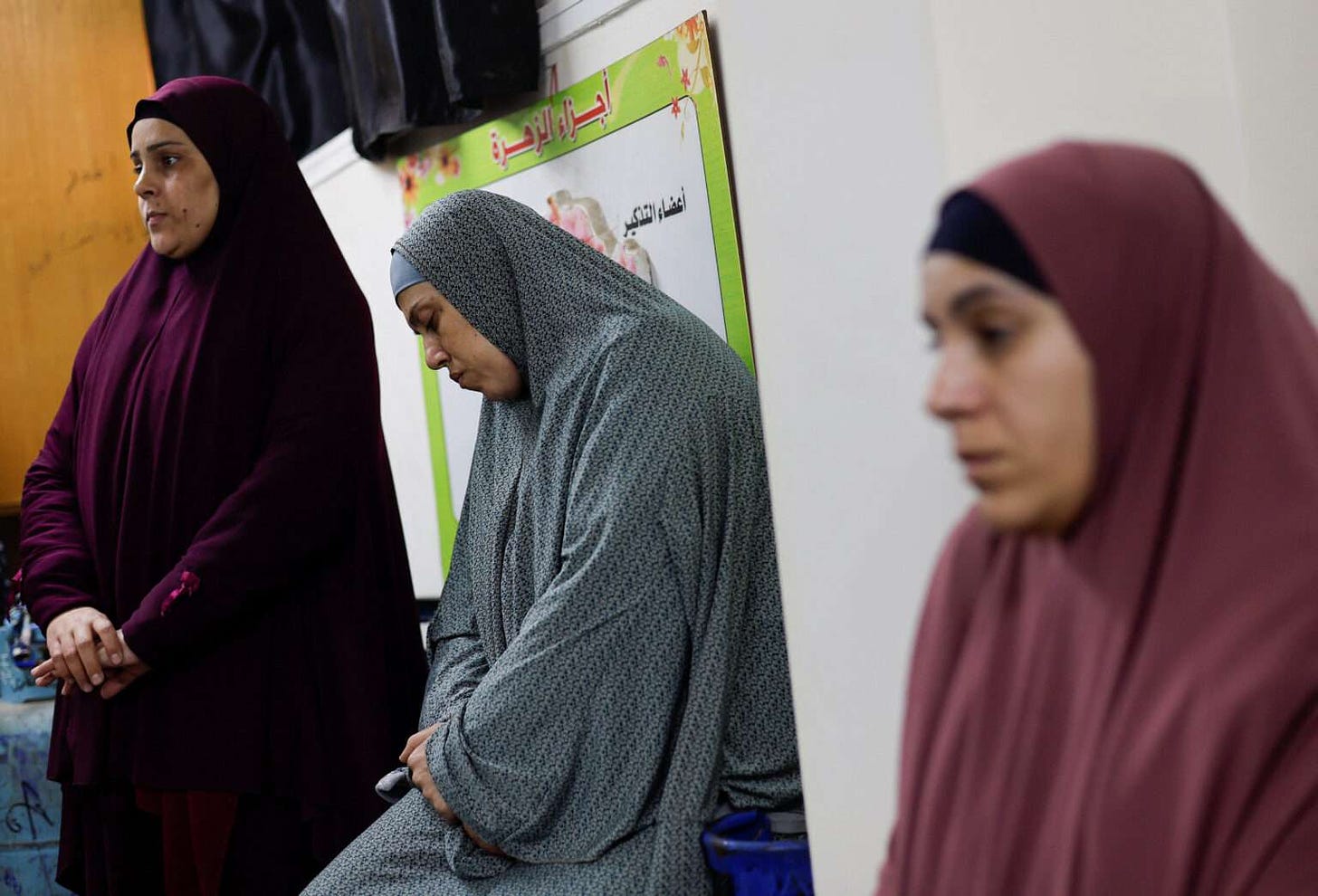
In testimonies given to Euromed Monitor, women in Gaza report being subjected to torture and rape by Zionist forces.
"We Israelis are the biggest Holocaust deniers - The Jewish state learned that it can commit its own Holocaust in Gaza and deny that it exists"
Jonathan Ofir for Mondoweiss.
Palestinian-American author Susan Abulhawa reports from her visit to Gaza:
Vanessa Beeley is a reader-supported publication. To receive new posts and support my work, consider becoming a free or paid subscriber.
The reality on the ground is infinitely worse than the worst videos and photos that we're seeing in the West.
People first resorted to eating horse and donkey feed, but that's gone. Now they're eating the donkeys and horses," Abulhawa writes. "Some are eating stray cats and dogs, which are themselves starving and sometimes feeding on human remains that litter streets where Israeli snipers picked off people who dared to venture within the sight of their scopes. The old and weak have already died of hunger and thirst."
"What I see is a holocaust." she summarizes. "The incomprehensible culmination of 75 years of Israeli impunity for persistent war crimes."
What has underpinned this wholesale slaughter of Palestinian civilians and children in Gaza - the 7th October Hamas "atrocities" that include the media-amplified claims of "mass rape".
Claims led by the discredited ZAKA organisation whose founder has a history of rape and pedophilia. ZAKA is reminiscent of the CIA/MI6 White Helmet propaganda productions in Syria from 2013 onwards, designed to criminalise the Syrian government. You can read my archive of investigative work exposing this organisation here.
I am not going to focus on the debunked claims made by the Zionist Hasbara industry. You can read and watch the multiple investigative reports that have dismantled the genocide-justifications here - 1, 2, 3, 4, 5, 6, 7, 8, 9, 10, 11, 12, 13, 14.
Two leading Palestinian media organizations, The Palestine Chronicle and Friends of Palestine Network, conducted a joint investigation, based on media reports, in addition to historical and political analyses.
I recommend following this X account to also have real-time updates on the collapse of the Zionist propaganda mill.
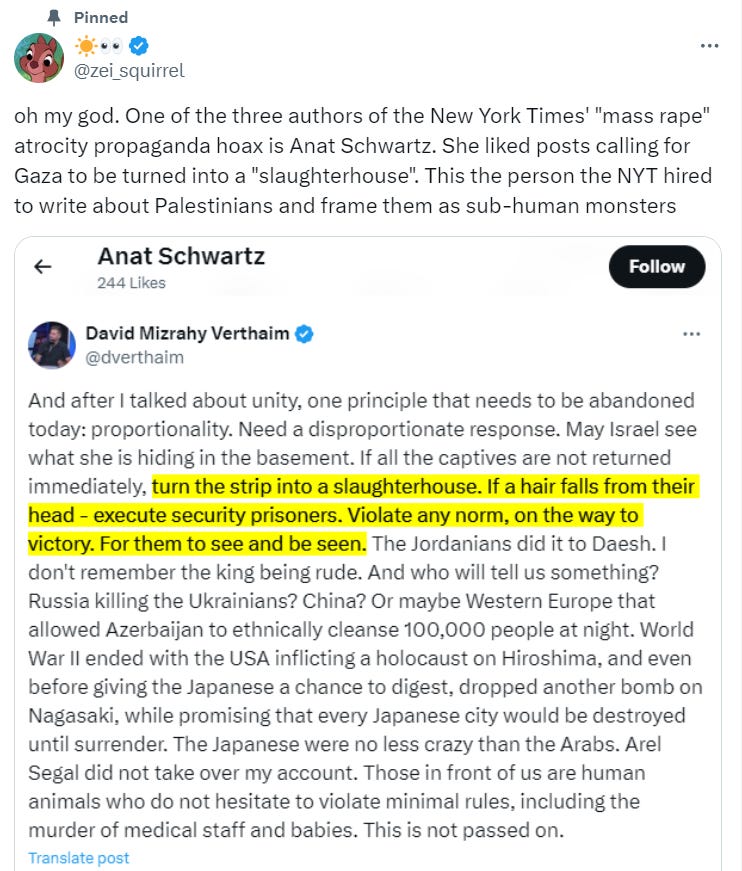
Journalist and researcher, William Van Wagenen, has also covered much of what actually took place on October 7th. Van Wagenen includes the "baked baby" narratives that were circulating shortly after the 7th October Resistance operations.
Eli Beer, founder and president of another rescue organization, United Hatzalah, made similar false claims.
While attending the Republican Jewish Coalitions' Annual Leadership Summit in Las Vegas on 28 October, he claimed that "A little baby in the oven – These bastards put these babies in the oven and put on the oven … We found the kid a few hours later."
Like all the other atrocity tales, this was also walked back and mocked on social media by the majority of independent media outlets who saw through the fabrication immediately.
2013 in Adra Industrial City, north of Damascus, Syria - extremist factions including Al Qaeda (Nusra Front) burned civilians alive in a bread furnace. The same extremist factions supported by Israel to overthrow a pro-Palestine Syrian government.
In 2014, a frail 16 year-old Mohammed Abu Khdeir was burned alive by Israeli extremist settlers amidst a number of Zionist settler kidnappings of young Palestinian boys.
the preliminary autopsy report states that the remnants of a burned substance (soot) was present in Muhammad's respiratory passages and lungs, indicating he had inhaled the substance while being burned alive.

Hussein Dawabshe with grandson Ahmad in 2016
In 2015 18-month old baby Ali Dawbsheh, was burnt alive by Jewish terrorists in the West Bank town of Duma. Ali's mother Riham and father Saad died of their wounds a few weeks later. Of the family of four, only 5-year-old Ahmad survived the arson with severe burns.
At the preliminary court hearing in Lod, terrorist Zionist settlers chanted:
"Where's Ali? There's no Ali. Ali is burned. On the fire. Ali is on the grill"
From the article in Mondoweiss:
In December 2015, a video showing dozens of wedding guests celebrating the arson went public via Channel 10. The guests are seen dancing with Molotov cocktails, knives and guns, and stabbing a photo of baby Ali Dawabsheh.
Literally 24 hours after the October 7th Resistance operation, on various interviews I recommended avoiding the rush to judgement being rammed down our throats by a Zionist-partisan media crush. I was absolutely correct to have cautioned thus and consider myself vindicated by the last six months of investigation into the Zionist hysterical claims.
Claims that only the Palestinian Resistance was responsible for all deaths on the day that unleashed genocide upon Palestine - or rather the intensification of a genocide that began 100 years ago under a malign British Mandate.
The reality of thousands of children horrifically burned, eviscerated, incinerated, executed, abused and tortured by the sadistic IOF forces since October 7th is something that cannot be eclipsed by the lies peddled by the genocidal maniacs intent on the extinction of Palestinians.
Euromed Monitor - Euro-Med Monitor's field team documented the Israeli army's field execution of 13 children near Shifa Hospital in Gaza City. The majority of them were with their families, following the Israeli military's instructions to evacuate their areas, when they were shot dead.
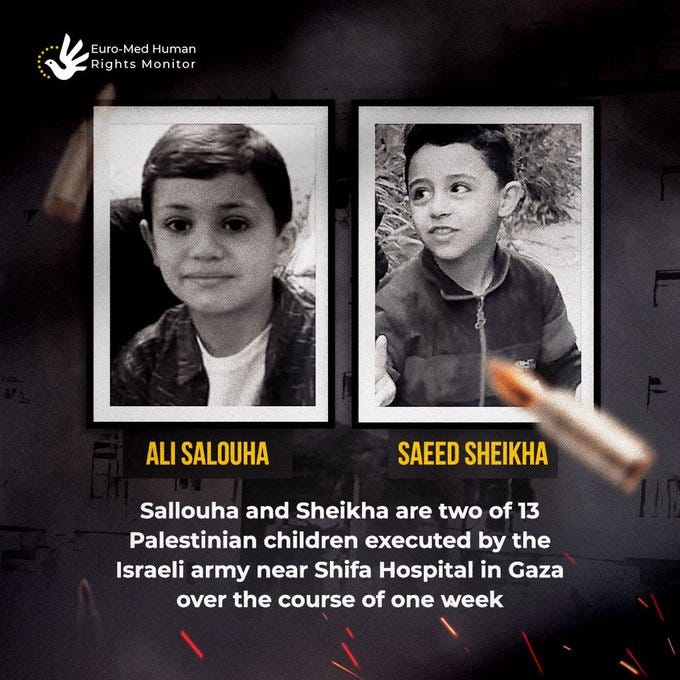
In the case of Zionist settler-colonialism in Palestine, the goal of acquiring land led to the use of brutal tactics aimed at the dispossession and elimination of the indigenous population. Colonizers embraced sexual terrorization as an instrument for achieving this strategy.
Tamam Mohsen
The "only Democracy in the Middle East" is reported to be a hub of sexual abuse, rape and ritual pedophilia cases. According to the Berghahn Journals:
Israel is a Pedophile HavenSexual violence is a common phenomenon in Israeli society. Despite its frequency, it is still kept silent in the public sphere. The last few years have seen a rise in awareness on the topic of sexual abuse and harassment; however it is a crime with a very low percentage of incident reports. This is for a variety of reasons, the main reason being that we live in a society that tends to blame the victim, which causes them feelings of shame and humiliation preventing them from reporting the incident.
Israel is a haven for pedophiles escaping prosecution in other countries. Perhaps the best known case is that of Malka Leifer. A former ultra-Orthodox Jewish school Principal sentenced to fifteen years for child sex abuse.
Israeli author and public speaker Alon Mizrahi went on X to point out Israel's harbouring of this criminal serial abuser of children:
This lovely lady, from a prestigious Hasidic family, was the principal of an ultra-orthodox Hewish school in Melbourne, Australia who in 2008 "faced trial on 70 sex offense charges laid by Victoria Police, with accusations from at least eight alleged victims" (from Wikipedia).
All victims were her former underage pupils.
To cut a long story short, lovely Malka fled to Israel in 2008, where she comfortably lived, thanks to generous help from senior politicians, psychiatrists, and extremely helpful judges, until 2021, when the scandal was making international news, with high-ranking Australian politicians intervening on behalf of the victims.
In March of 2023 Leifer was found guilty of 18 counts of sexual abuse, including rape, and was sentenced to 15 years in prison.
But for 13 years, Israel refused to extradite Leifer to Australia, and she was allowed to lead her normal life in a West Bank settlement. And that's how much Israel cares for (Jewish!) victims of sexual abuse.
In 2020 Jerusalem Post ran the headline - Tens of Thousands of Pedophiles Operate in Israel every year.
Annually there are 100,000 victims of pedophilia in Israel according to one monitoring organisation.
While indigenous Palestinians are denied the right to return to their homeland, a number of pedophiles in Israel are "Jewish" immigrants who have exploited the law of return (whereby any Jewish person can move to Israel and automatically gain citizenship) to seek refuge from prosecution for their heinous crimes.
Mainstream media in the US is reporting on the Jewish American pedophiles who "hide from justice" in Israel after subjecting children to abuse and rape. Jewish Community Watch says the majority of its cases originate from modern Orthodox to Ultra-orthodox Jewish enclaves in the U.S., but that it happens across the wider Jewish community.
Even Hollywood's accused sexual predators are seeking refuge in Israel. Hollywood filmmaker Brett Ratner fled to Israel after six women accused Ratner of sexual assault and sexual harassment in 2017. A report in Haaretz describes Israel as a "hot spot for foreign Jewish sexual predators".
Another Haaretz report in 2016 cites Manny Waks, the chief executive officer of Kol v'Oz, a newly formed nonprofit that aims to prevent child sexual abuse in the global Jewish community:
"Sex offenders tend to move from country to country to avoid jail, but what makes Israel unique is the Law of Return, which essentially grants unhindered access to anyone who is Jewish to come here without any real screening,"
The same story was covered by the UK's Independent. This phenomenon cannot be dismissed as "conspiracy theory", it is fact.
More Haaretz investigations can be found at these links - 1, 2,
From the American Psychological Association:
This study explores thought patterns of Jewish Ashkenazi Ultra-Orthodox pedophiles in Israel and how they resolve the contradiction between their commitment to Jewish Law and having committed sexual offenses against minors.
In 2022 Haaretz reported that 100 rabbis, teachers and other figures who have been accused, charged or convicted of sexual abuse overseas have already found refuge in Israel.
Also in 2022 The Jerusalem Post reported that the rate of sexual abuse of kids is highest among religious Zionist sector. "A new study by the Ne'emanei Torah Va'avodah movement reveals dramatic data on sexual abuse victims from the religious Zionist (Tzioni Dati) sector." The abused often become abusers. How many of these abused children (majority male) are the IOF forces of tomorrow?
More Jerusalem Post investigations (one Times of Israel) can be found at these links - 1, 2, 3, 4.
A Haifa psychologist was arrested in 2021 for 'indecent acts on children in his care'.
In March 2024 almost 6 months after October 7th, an Israeli male nurse, Oren Hananaiev, had his medical licence revoked after being 'convicted of severe indecent acts without consent and possessing and publishing inappropriate content featuring underage children.'
From the analysis of Hananaiev's correspondence, many conversations were found with Yaakov, in which he advised him to use sedatives to "prevent resistance" during sexual assault. Furthermore, the investigators found correspondence between the two where Hananaiev suggests certain children's games where one might sexually exploit kids while they still think that it is part of the game.
According to the Journal of the American Academy of Psychiatry and the Law (2011):
The number of incarcerated sex offenders in Israeli prisons, which may be related to the total number of sex offenders, has been steadily increasing, from 350 offenders in 1997, to 1300 in 2009.
About 60 percent of convicted sex offenders in Israel have committed offenses against children under the age of 13.
Israel's ultra-Orthodox community is rife with accusations of sexual offences against minors. Pedophiles seek refuge in Israel for a good reason. They are in "good" company.
How many of the Brooklyn, New York, Haredi cult accused of sexual abuse have sought refuge from exposure and justice, in Israel?
A far-right Israeli lawmaker accused Israel of trying to normalise pedophilia as recently as May 2023, only a few months before Israel was accusing the Palestinian Resistance of "mass rape". As many have stated on social media "an accusation is a confession".
Israel has failed in almost every way in treating sexually abused children, says a report by a committee of experts aiming to change social norms, treatment and government policy on the issue. (Haaretz)
Jerusalem Post reports that since the start of the Israel-Hamas war, around 56,000 Israelis have been forced to flee their homes and live in hotels throughout the country.
These hotels are allegedly a "ticking time bomb of crime" - Cases included indecent exposure, crimes against children, and rape amongst other violent incidents. Even Israeli settlers are prey to the overt sexual predation that pervades their society.
The Limited Times:
Israel - a history of rape as a weapon of terrorZion Vanuno, 64, is suspected of committing indecent acts against children in a hotel with evacuees in the center of the country. According to the suspicion, Vanuno lured the children with candies to go to different places in the hotel, where he committed indecent acts on them.
In his article "Israel and Rape" journalist Robert Inlakesh goes into some detail about the cases of rape and sexual harassment within the IOF armed forces.
There have also been credible claims by a female soldier that she was raped by a fellow serviceman during the ongoing brutal military assault on Gaza.
Sexual harassment and violence are nothing new among Israel's armed forces. According to a Haaretz report, "a third of female conscripts in the military had suffered sexual harassment at least once in the previous year [2022]."
In 2020, the Israeli army's sexual violence crisis was recognized after only 31 indictments were filed out of 1,542 sexual assault complaints registered within the military establishment.
It has been reported that a growing sector of Israeli society rape Israelis, they rape tourists, they abuse and rape children, they rape their own evacuees. How these predators (especially in the IOF) react to Palestinians that have routinely been dehumanised and reduced to legitimate targets for an inherent predatory sadism is naturally expected to be a hundred times worse. And it is.
The Tantura Massacre 22nd - 23rd May 1948.
On the night of 22-23 May 1948, a week after the declaration of the State of Israel, the Palestinian coastal village of Tantura (population 1,500) was attacked and occupied by units of the Israeli army's Alexandroni Brigade. During the Nakba or the ethnic cleansing of Palestine in 1948 some 400 villages were razed and occupied by Zionist forces.
Tantura was one of the tens of Palestinian villages and towns inside and outside the boundaries of the UN-envisaged Jewish state specifically targeted for capture under the notorious Plan Dalet, the Haganah master plan for the military establishment of Israel on the largest area possible of Palestine.
Palestinians were caged in makeshift cages and mowed down by machine-gun fire. Schoolchildren were ruthlessly shot even if they had raised their hands in surrender. Civilians were burned alive, buried in communal graves. Young girls were raped.
How different is this to what the IOF are doing in Gaza for the last six months but on an unprecedented scale.
Sabra and Shatila in 1982 witnessed the massacre of an estimated 3,500 Palestinians by Christian militiamen enabled and presided over by the Zionist forces. As journalist Robert Fisk said:
They (Israel) had trained them, given them uniforms, handed them US army rations and Israeli medical equipment. Then they had watched the murderers in the camps, they had given them military assistance - the Israeli airforce had dropped all those flares to help the men who were murdering the inhabitants of Sabra and Chatila - and they had established military liason with the murderers in the camps
According to multiple reports rape was also a feature of the Phalange militia on their genocidal rampage through the Palestinian community.
Fisk's horrifying description of what he saw is haunting - here were women lying in houses with their skirts torn torn up to their waists and their legs wide apart, children with their throats cut, rows of young men shot in the back after being lined up at an execution wall. There were babies - blackened babies babies because they had been slaughtered more than 24-hours earlier and their small bodies were already in a state of decomposition - tossed into rubbish heaps alongside discarded US army ration tins, Israeli army equipment and empty bottles of whiskey.
No different to the descriptions of decomposing bodies in and around Al Shifa Hospital or the corpses crushed beneath the tracks of a Zionist tank or bulldozer, children shot, their bodies left next to the white flag they were carrying. The terrified elderly man shot dead because he was dehydrated and couldn't keep moving.
The merciless Zionist bloodlust has only grown in strength since the first days of dispossessing Palestinians of their lands and their lives.
Rape and the threat of rape is systematically used in Israeli prisons for Palestinian women, children and men. A web search will reveal countless reports on the degrading and inhumane treatment of female prisoners forced to endure humiliating body searches and threatened with rape if they do not comply.
The crimes committed by the IOF in Gaza since October 7th replicate the crimes committed during the Nakba and in the 75 years of Zionist occupation of Palestinian territory.
Female detainees were submitted to sexual violence, torture, inhuman treatment, strip searches, sexual harassment, and rape threats while being arrested and held by Israeli army forces according to testimonies collated by Euromed Monitor.
A UN report published in February 2024 said experts were appalled by reported (Israeli) human rights violations against Palestinian women and girls.
"We are particularly distressed by reports that Palestinian women and girls in detention have also been subjected to multiple forms of sexual assault, such as being stripped naked and searched by male Israeli army officers. At least two female Palestinian detainees were reportedly raped while others were reportedly threatened with rape and sexual violence,"
Palestinian prisoners that had been stripped naked and were tortured allegedly became entertainment for the Israeli spectators that were brought in by the IOF to watch the sadistic process. They were given permission to film the torture on their mobile phones.
In 2010 a report was submitted to the UN Special Rapporteur on Torture. It involved the Zionist sexual assault or threatened sexual assault of Palestinian children aged between 13 and 16. The torture was used to obtain confessions from the children, admitting to stone throwing. Read more here, here and here.
The depositions sent to the UN report direct attacks, including squeezing boys' testicles, pushing a blunt object (a club or rifle stock ) between the chair and a child's buttocks, and repeated threats of "I'll screw you if you don't confess you threw stones."
Of course the Zionist censorship machine moved to shut down the NGO, Defence for Children Palestine, that dared to expose the sexual abuse of minors by Israeli forces and security sectors. In October 2021, the DCIP was designated a terrorist organisation by Israeli authorities along with five other Palestinian NGOs.
Khan Younis in Gaza - History repeating itself?An account (described by Zionists as fiction) from 1956 describes the slaughter and rape carried out by the Zionist forces in Gaza, in particular in Khan Younis.
According to the accepted Palestinian narrative, about 275 Palestinians were killed in the Khan Yunis massacre, while some 111 people were killed in Rafah. Rape was allegedly permitted to control the rebellious Palestinians.
The following letter was sent by a Golani Brigade soldier to his girlfriend on November 6, the day after the Sinai Campaign concluded, which is kept in the IDF archive. It is no different to the rhetoric we hear from IOF savages now inside Gaza or from the extremist Zionist settlers in West Bank:
Only the Arabs are to blame for all this and at every opportunity I take revenge on them," he wrote. "I am not satisfied with the amount [of people] I have already killed; we killed hundreds but for me it is not enough. At every opportunity I take revenge on them, and opportunities are not lacking, especially these days when I am among thousands of Arabs. They are under curfew, and this is a great opportunity to do anything we want to them. And I'm doing just that, and I won't stop until I am on my way home, I swear.
Palestinian memory holds years and dates close.
The Nakba was in 1948, the Naksa in 1967, Sabra and Shatila September 1982, the Intifada '87. November 3, 1956, however, does not live in infamy. Despite being one of the greatest massacres of Palestinians, the Khan Yunis massacre that brutally took the lives of hundreds of Palestinian men and boys, has only received a footnote in history- a mere few lines in a UN report. (Article in Palestine Chronicle)
The massacre of Khan Yunis in 1956 reached twice the number of the Dier Yassin massacre and lasted longer than the massacre that took place at Sabra and Shatila. Read more here.
Rape is a weapon of terroristsIn the case of Zionist settler-colonialism in Palestine the ethnic cleansing of Palestinians has always been carried out with maximum brutality. The colonizers trained by the British relished sexual terrorism as one of their most potent instruments of power and subjugation of an unruly, justifiably resistant population.
It can be argued that rape or the threat of rape was a primary reason that many communities fled their villages and homes in 1948. The present day oppression of Palestinian women in the Resistance or political movements challenging the Zionist entity is dependent upon rape and sexual abuse to coerce female prisoners into confessions, sometimes even into collaboration.
The freed Palestinian prisoner, Rasmea Odeh, publicly spoke in an American court about how she was raped by Israeli intelligence interrogators. Odeh, who was arrested in 1969 at the age of 19, reported that during her interrogation, she was beaten with wooden sticks and metal bars, and was left naked in a blatant violation of her sexuality.
Odeh was sexually tortured with electric shocks. Wires were attached to her genitals, breasts, abdomen, arms, and legs, and in that disoriented state, she was raped with a stick while her father was forced to watch. (Mondoweiss)
Prominent Israeli Rabbis like Rabbi Shmuel Eliyahu have advocated for rape in wartime. A leading Israeli professor, Mordechai Kedar of Bar-Ilan University, explicitly called for the rape of Palestinian women to deter the Palestinian resistance during the unrest of the summer of 2014.
Later, in 2016, Rabbi Colonel Eyal Qarim of the Israeli Military Rabbinate also echoed the same notion, making allowances for the rape of Palestinian women by Jewish Israeli soldiers "out of understanding for the hardship endured by the warriors." (Mondoweiss)
The apartheid Zionist state passed a sexual terrorism law in July 2023. The law was condemned for allowing Jewish Israelis to have a far lesser punishment for rape, sexual assault and sexual harassment than Palestinian citizens.
The law directly targets Palestinian citizens of Israel who are accused of sexually assaulting or harassing Jewish women if authorities deem the motive as "nationalistic".
The irony should not be lost on you.
Rape by the Zionist military, intelligence or police forces is not restricted to children and women. Men are also submitted to horrific torture practices including rape.
Mustafa Dirani was abducted by an Israeli "elite force" from inside Lebanon in 1994. He was finally released in 2004. Dirani claimed compensation for alleged rape by a Shin Bet interrogation expert.
The ritual humiliation of women is also not confined to within prison walls. Since the beginning of the Al Aqsa Intifada on September 28 2000 until July 2006, 68 pregnant women had to give birth at checkpoints, 34 infants and 4 pregnant women died on these checkpoints.
Israel and Abu GhraibWhen the images of prisoners taken by the IOF in Gaza emerged, men stripped down to their underwear in winter, beaten by metal pipes or guns, urinated on by their monstrous captors - it was likened to scenes from Abu Ghraib. As the inhumane abuse expanded across Gaza and included women, the comparisons increased.
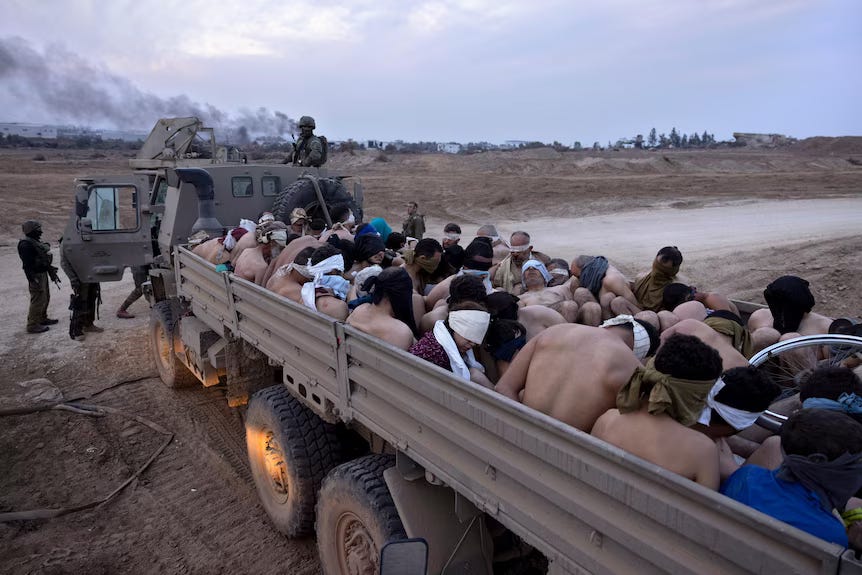
Journalist W Van Wagenen wrote about the Israeli involvement in Abu Ghraib, in particular at Facility 1391:
But the "creative" torture techniques focusing on sexual humiliation and rape have a clear origin.
Israeli interrogators were teaching US contractors and MPs torture techniques that Israel has long used against Palestinians and other Arabs.
In November 2003, as Cambone was lauding Israel for its assistance in Iraq, The Guardian published a report detailing the torture Israel subjected prisoners to at a secret prison known as 'Facility 1391.'
"I was barefoot in my pajamas when they arrested me, and it was really cold," says Sameer Jadala, a Palestinian school bus driver. "When I got to that place, they told me to strip and gave me a blue uniform. Then they gave me a black sack," for his head.
Other former prisoners at Facility 1391 have described how they were stripped naked for interrogation, blindfolded, handcuffed, and threatened with rape. (emphasis added)
There can be no denying that Israel has a culture of rape and abuse of those it considers 'untermensch'. It is engrained in their psyche and has been for almost a century because they believe they are not only "chosen" but "untouchable". The British spawned a Frankenstein's monster and they have lost control of the rapacious entity that is committing crime after crime against Humanity, not only in Palestine.
Britain forced Zionism on the population by allowing mass 'immigration', by arming the zionists while disarming the Palestinians, and by using all other weapons available to an occupying power to crush resistance. Thousands of Palestinians were killed when they rebelled in the 1930s, all attempts to reason with the British having failed.
Executions and the collective punishment of whole villages were part of how Britain lived up to its 'sacred trust of civilization.' The leadership needed for the coming stages of confrontation with the zionists was largely decapitated. The British did their dirty work for them. (Jeremy Salt)
"In order to escape accountability for his crimes, the perpetrator does everything in his power to promote forgetting. If secrecy fails, the perpetrator attacks the credibility of his victim. If he cannot silence [them] absolutely, he tries to make sure no one listens." Judith Lewis Herman - Trauma and Recovery: the aftermath of violence, from domestic abuse to political terror.
An illegal settler colonial entity built on genocide, rape, torture, apartheid and oppression will always fail eventually. It is only a matter of time before the truly depraved and rotten Zionist core will surrender to its own internal moral decay and implode.
****
Please do consider subscribing to my Substack. Thank you to all those who already do. x
Vanessa Beeley is a reader-supported publication. To receive new posts and support my work, consider becoming a free or paid subscriber.
4 Apr 2024 | 8:59 am
7. Israel's serial convention violation, WCK aid workers maybe, UK regime buries legal report on Israel's crimes

Israel claims aid workers killed by mistake, satellite images prove otherwise - but who are the WCK workers in Gaza?
My report for UK Column News on the Zionist deliberate targeting of World Central Kitchen aid workers in Gaza. Who is this organisation? Why are they there really and who does the fall out from this attack benefit?
The following remarks are from Lawyers of Light on Telegram:
UK aid workers killed in Gaza were linked to the SAS/SBS - elite sections of the British Miliatry. It's smelling like it wasn't an 'accident' in our opinion. Why were they killed? And exactly why were they there. Is there more to this story?
"All three were former soldiers in the British military, and worked as private security contractors for UK-based firm Solace Global"
Solace Global's current and only director is David John Peach.
"Peach of Solace Global has more than 10 years of experience in the private security industry, and almost 20 years as a Royal Marine to draw on before that.
"Solace Global offers security services for corporations and high-profile individuals such as travelling business executives or media teams in dangerous areas, or high-net-worth individuals or families. One of their areas of expertise is mobile security such as private aeroplanes, shipping or superyachts"
In 2014 Solace Global announced the formation of a "prominent security Advisory Board" "to draw on its extensive experience and knowledge in global security, intelligence and risk management to help facilitate the company's growth and further develop its expertise", appointing Michael Crawford CMG and Russell Corn to the newly formed board. We cannot see if either or both are still with Solace from a cursory check, (too busy at work but sure someone can dig deeper).
Michael Crawford CMG - an independent consultant specialising in strategic political risk in the Middle East since 2010. He served the British Government at home and overseas between 1981 and 2009, including in Yemen, Egypt, Saudi Arabia and Pakistan. During his career, he worked on Middle East and South Asian politics, counter-terrorism, counter-proliferation and global security issues.
Russell Corn - a former UK Special Forces officer. Began career as the Group Operational Security Manager at Prudential Plc, but left to build the UK and European operations of Diligence Inc, "quickly positioning it as one of the top tier risk management and advisory firms in Europe".
In 2011 Russell established Fulcrum Consulting Ltd, which advises corporate and private clients in matters relating to counter-party risk, political risk, business intelligence and security. Russell is also a Partner in Fulcrum Chamber LLP and as such is one of the first non-lawyers to be accepted into a law firm following the Legal Services Act of 2007.
Smells like it could be black ops, government initiated, off books work tbh. And what is a former head of counter party risk at a law firm doing in Palestine? Or did these guys see something they should not have whilst providing security services to the aid agency?
Corn has several other appts related to companies called Fulcrum on companies house and when you look at linked directors of those it all looks a bit murky. Needs further investigation as there is a link to an Esther Dowling of Fulcrum Diligence, a company who were awarded a £100,000 contract from the Dept for Levelling Up and Housing UK in 2022 for financial consultancy. Might be something. Might be nothing.
End quote.
I also reported on the Israeli attack on the Iranian Consulate building in Damascus on Monday:
Finally a quick report on the UK regime's lack of transparency over a legal report that determines Israel has violated International Law in Gaza and recommending that the UK ceases arms supply to the Zionist entity.
****
Please do consider subscribing and thank you to everyone who already does. x
2 Apr 2024 | 9:58 am
8. Israel bombs Iranian Embassy in Damascus
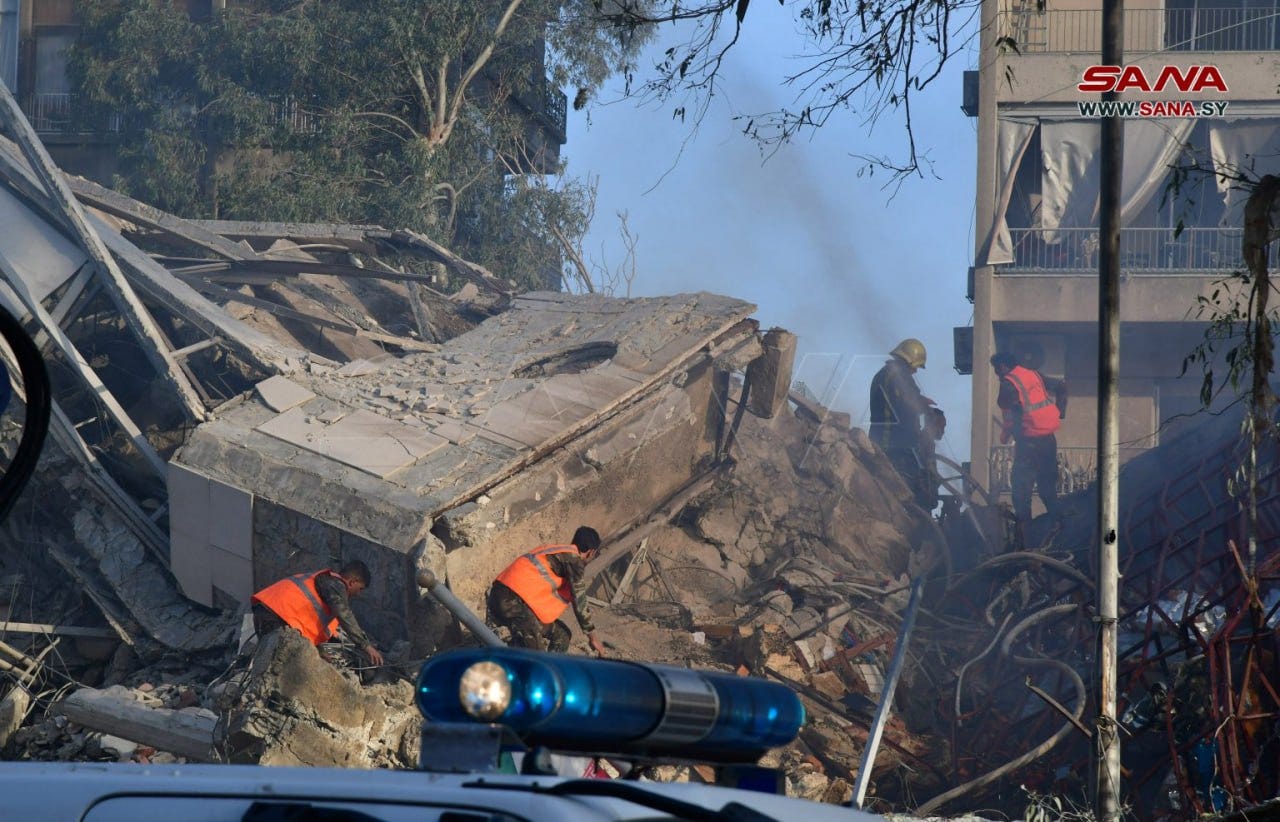
Israel destroys the Iranian Consular building which is part of the Iranian Embassy compound in central Damascus.
I will be doing more reports for UK Column News tomorrow but here are a couple of interviews I did yesterday. First for RT literally immediately after the Zionist aggression:
The following martyrs among the IRGC advisors in Damascus have been confirmed. Martyr Commander Mohammad Reza Zahedi - Martyr Commander Mohammad Haji Rahimi - Martyr Hussein Amanollahi - Martyr Sayyid Mahdi Jalalti - Martyr Mohsen Sadegh - Martyr Ali Agha Babayi - Martyr Sayyid Ali Salehi.
Syrian Arab Army soldiers were also martyred and there were injuries and martyrs among civilians. This was two hours before Iftar (breaking of the Ramadan fast) and in a busy central area of Damascus - Mezzeh highway.
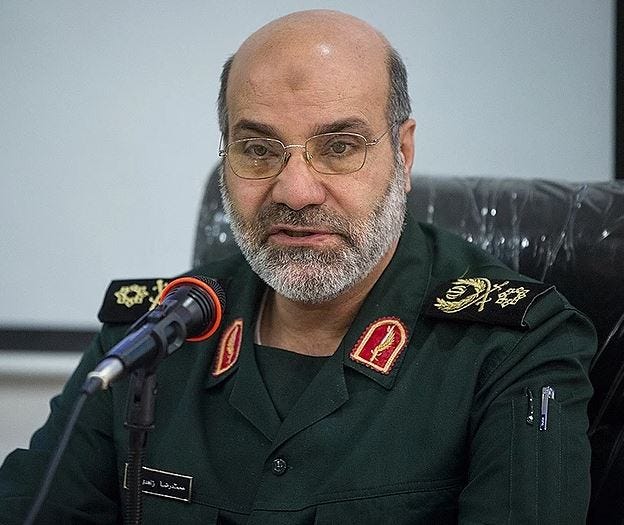
From Press TV - Born in 1960, Zahedi joined the IRGC in 1980 and was a commander of the elite force during the Iraqi-imposed war in 1980-88.
He was the commander of the IRGC Air Force from 2005 to 2006. Later he served as the IRGC Ground Force Commander from 2006 to 2008.
Zahedi served as a commander of the IRGC Quds Force from 2008 to 2016.
Video of the devastation immediately after the attack:
Nour News Agency, affiliated with the Iranian National Security Council:
"Everything is ready for harsh revenge on the evil rulers of Israel."
The Zionist regime has embarked on a dangerous adventure by attacking the Iranian consulate in Damascus and killing our country's military advisers. The presence of a high motive for revenge in Iran and the wave of condemnation of this action by different countries show that everything is ready for tough revenge on the evil rulers of Israel.
Russian MoD:
The attack on the Iranian embassy is a very dangerous escalation that may take the region into open war. It is an attack on Iranian territory, as the embassy is considered Iranian territory.
Russia has called an emergency session today in the UNSC to discuss the Israeli violation of Syrian and Iranian territory.

Hossein Amir-Abdollahian
Iranian Foreign Minister says, as the Israeli regime's biggest supporter, the United States should be "answerable" following an earlier deadly attack by Tel Aviv against the Iranian consulate in the Syrian capital Damascus.
Erfan Lajevardi:
The attack by pro-Iranian forces in Iraq on one of the strategic facilities of the port of Eilat last night cost the Israeli regime very dearly and forced Israel to hastily attack the Iranian consulate without thinking about the consequences. Considering that the Israeli regime attacked the Iranian consulate, and according to international law, consulates and embassies are considered part of the territory of any country, Iran will also attack Israeli positions using its proxies.
Iran, unlike Israel, is not acting hastily. It can be said that the main reason for Iran's strategic victory and its widespread influence in the region is the lack of haste in planning a retaliatory strike against the enemy.
My point of view is that the Israeli regime will receive two blows from Iran: the first is an attack on the strategic positions of the Israeli regime's armed forces in the occupied Golan Heights. The second target is the Israeli regime's embassies around the world.
Message from a friend of mine:
Everyday, when I think that nothing could be worse than what the zionist terrorists have done already, they do more. Today they:
- bombed the Iranian embassy in Damascus (AN EMBASSY!) killing at least seven,
- totally destroyed the main hospital (A HOSPITAL!) in Gaza, killing 400 patients and civilians sheltering there (400!), and
- murdered four foreign humanitarian aid workers trying to feed the people in Gaza (HUMANITARIAN AID WORKERS!),
- created 'Kill Zones' where anyone entering them will be considered a terrorist and murdered (ANYONE!).
If you've been following the ongoing genocide in Gaza, and the escalating Israeli bombing and missile attacks on Lebanon and Syria, a logical conclusion you can draw from the evidence is that Israel is trying to provoke a wider war, to include Hizbollah, Iran, and then the US. Pray they're unsuccessful.
Video - demonstrations last night in Palestine Square, Tehran:
Then, later last night I spoke with Ryan Cristian of The Last American Vagabond and pointed out the simultaneous surge in terrorist attacks on all axes in Syria in collaboration with the Zionist entity. You can watch the whole daily wrap here.
(Apologies for sound quality at times)
****
Please do consider subscribing to my Substack. I am currently the only 'Western' journalist permanently in Syria to bring you on-the-ground reports. Thank you! x
29 Mar 2024 | 7:52 am
9. Israel's attacks on Syria take a new and unexpected direction
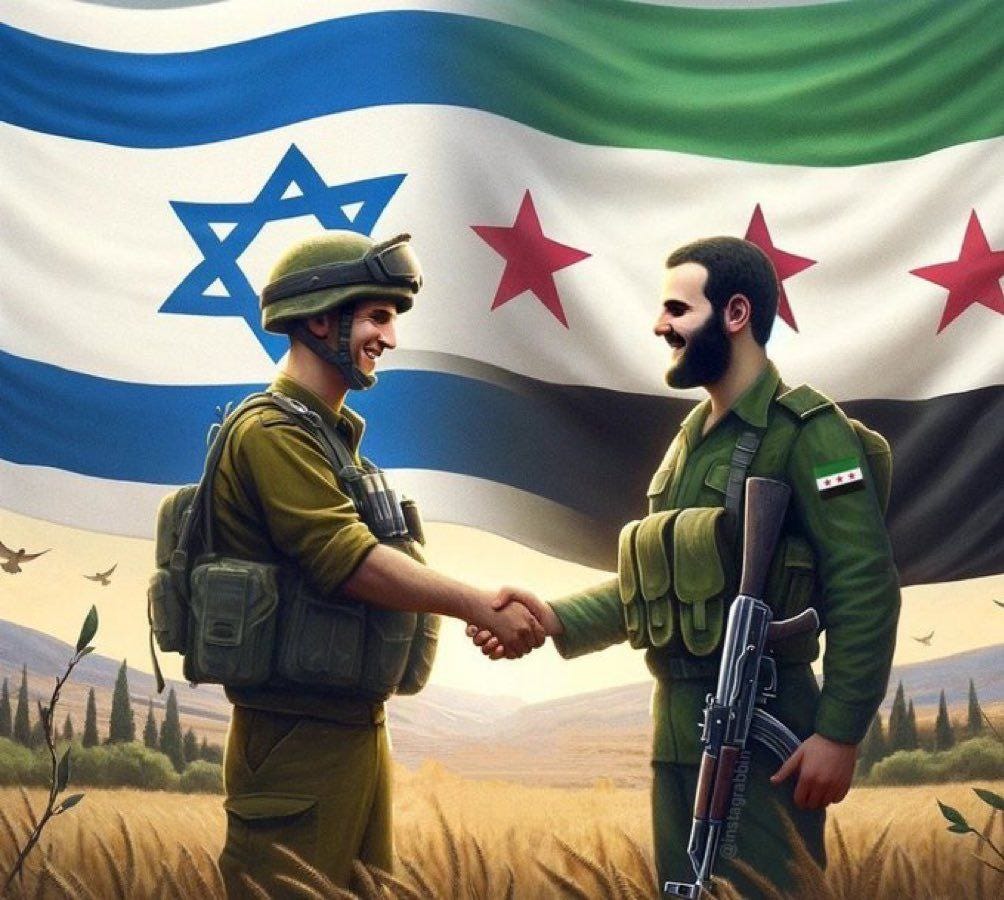
"Israel stood by our side…We wouldn't have survived without Israel's assistance" – including weapons the Netanyahu regime supplied. Spokesman for one extremist group in Syria 2017
Video of the Israeli aggression against eastern Aleppo. One target was an ammunition store which continued burning for 2-3 hours:
Israeli aggression against Syria takes a new turn - escalation or desperation?Official statement from the Syrian Ministry of Defence:
At 1:45 am, the Israeli enemy launched an air attack from the direction of Athriya, southeast of Aleppo, targeting several points in Aleppo countryside, in conjunction with a drone attack carried out by terrorist organizations from Idlib and Aleppo western countryside, in an attempt to target civilians in Aleppo city and its surrounding.
The aggression resulted in the martyrdom and injury of several civilians and soldiers, and material losses to public and private property.
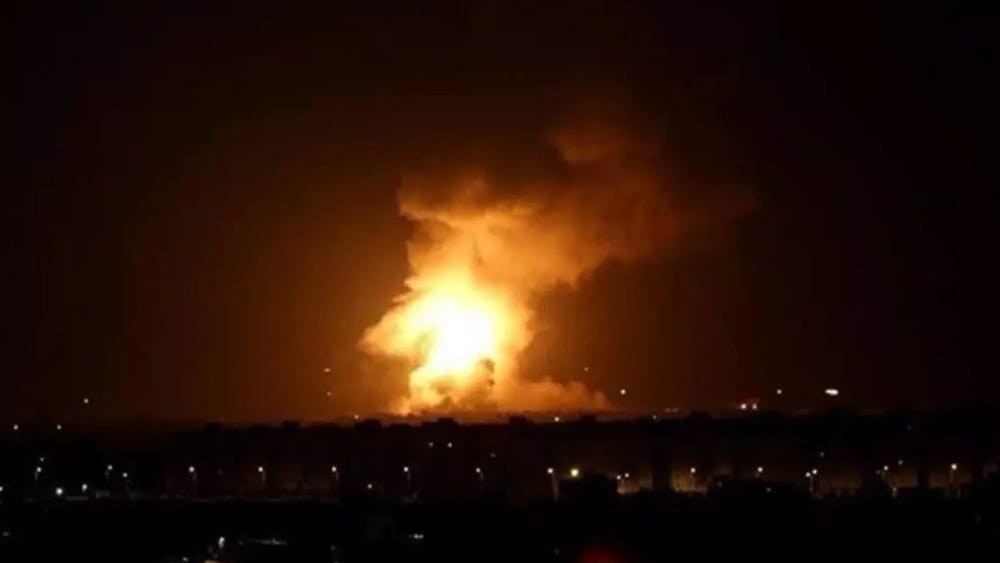
Israeli warplanes infiltrated Syrian airspace via Jordan. They used the Syrian airspace over the illegal US base in Al Tanf (on the border with Jordan) to proceed towards the depths of the central Syrian Badia or desert area at low altitude to avoid detection. The missiles were fired from the Athriya area with U.S. cover towards several targets in the eastern Aleppo suburbs that until December 2016 were occupied by the Western-midwived terrorist gangs.
Simultaneously terrorist groups in Idlib (north-west) dominated by HTS (Al Qaeda) launched a massive attack with suicide drones on civilians in Aleppo City in an attempt to divert the Syrian Air Defence teams.
The Israeli aggression targeted the Jibreen area of eastern Aleppo, close to the Aleppo International Airport and the Ibn Al Khaldoun psychiatric hospital whose patients were terrified having already endured the five year occupation by the same terrorist gangs.
This combined attack was intended to stretch the capability of the Air Defence in defending Aleppo against the dual attacks.
Israel not only targeted Jibreen, it also targeted Kfarjoum to the West of Aleppo.

Sites hit included a gas station, weapon depots and various buildings and is considered as the most intensive attack on the Aleppo governorate by Israel - so far there are at least 30 martyrs (the number is still expected to rise) including women and children. Friends in Aleppo described it as "judgement day", the explosions were so loud and the attack so intense.
These are people who lived through war since 2012.
There were also Syrian Arab Army martyrs and from Hezbollah units in the area. Some of the names of the martyred Hezbollah fighters:

Ahmad Jawad Shhemeh, 1964
Mustafa Ahmad Makkeh, 1984
Ibrahim Anis Al-Zein, 1982
Ali Mohammad Al-Haf, 1982
Mustafa Ali-Nasif , 1991
A sixth fighter is reported to have died from his wounds.
Explosions continued for at least two hours due to the interception of the Syrian Air Defence combined with the fire and explosions from the weapons depots.
The day before at 5.50pm Israel had carried out a failed assassination attempt against a farm in Bahdaleyah town next to Sayyeda Zainab in the southern Damascus countryside. The farm was completely destroyed but the Hezbollah fighters had evacuated minutes before the strike and escaped. Two civilians were injured.
The two attacks within eight hours demonstrates Israel's mounting desperation to inflict damage upon Hezbollah bases and fighters in Lebanon and Syria which is known to be the backbone of the resistance and a safe haven for the Hezbollah forces who were instrumental in the liberation of specific Syrian territory from US allied terrorist groups since the regime change war began in 2011.
Both aggressions targeted Hezbollah sites. The attack on Aleppo was unexpected - it is far away from the southern Lebanon front and logistically speaking it is not a natural target for Israel.
Therefore it can only be interpreted as an Israeli attempt to expand the war against Hezbollah specifically while triggering an escalation from the north-western Al Qaeda groups to further pressure the Syrian Arab Army forces and Air Defence teams and to distract the Syrian-based Resistance groups away from any attacks on Israel.
Lebanese journalist Qassem Qassem recently said:
I believe that the intensity of the clash and escalation with the Israeli enemy has increased and that the moment of heading to a battle that may develop into a war is approaching.
I believe that the Israeli enemy is preparing itself for a military campaign against Lebanon, and is now working to get rid of some of the obstacles it has, such as ammunition and the American green light.
I believe that the visit of Security Minister Gallant comes in the context of preparing for the attack on Lebanon and not for the Rafah operation.
Most Israeli military analysts speak with certainty about launching a campaign against Lebanon and that it is a matter of time.
All of this may be for exaggeration, but I believe that the time for exaggeration for Israel ended on October 7, especially after it faced the existential threat.
What this does show is that Israel is cornered. It is losing the ground war in Gaza against a relatively ill-equipped, starving and besieged Palestinian Resistance while the IOF forces on the ground in Gaza commit hourly atrocities against civilians, all caught on camera. Israel's image as the 'most moral army'-'only democracy in the middle east' is irretrievably destroyed.

Article in the Telegraph. Reported by The Cradle:
Israeli intelligence officials told The Telegraph that the government's stated goal to "eradicate Hamas" in the Gaza Strip has become unachievable after the US "turned its back" on Tel Aviv by abstaining during a UN Security Council (UNSC) vote earlier this week.
"If you'd asked me this a month ago, I would definitely say yes [we can eliminate Hamas] because, at that time, the Americans were backing Israel," an Israeli intelligence official told the British daily, reportedly suggesting this assessment "had now changed."
"The US doesn't support going into Rafah, which they did before, so the cards right now are not good, meaning Israel has to do something dramatic and drastic to change the momentum and climate," the source added, highlighting that "pressure is mounting on Israel to reach some sort of a deal, which means Hamas could survive. Both Hamas and the Iranians are playing on that."
In the north on the border with Lebanon the 200,000 settlers and businesses that fled the conflict are destined to never return. Yemen has effectively blockaded an arterial sea route and even with the aid of the 'normalised' Abrahamic Accords regional countries like UAE, Jordan etc Israel's economy is dying and military morale is on its knees.
The veils have been lifted. Israel is trying to expand the war to gain a victory which will ensure its survival. It has clearly demonstrated its allegiance to the Zionist-allied Al Qaeda factions in Idlib and is losing face globally. It has isolated itself even from the U.S. thanks to Netanyahu-hubris. It is trapped and flailing but perhaps at its most dangerous.
It is worth noting that ISIS attacks have also been increasing exponentially since October 7th, many coming from the US illegal military base at Al Tanf, used by Israel to launch attacks on Syria.
It is no longer possible to deny that the clear and present axis of terrorism in Syria is US-UK-Israel-Turkey-EU-Jordan-ISIS-Al Qaeda. The battle lines are no longer blurred, they are crystal clear. Those Palestinian supporters still promoting Idlibistan as a beacon of support for Palestine should take note.
Will Israel maintain escalation? What will the U.S. and U.K. do with elections looming? Whatever the outcome the Resistance is ready. Israel, the Zionist colonialist settler state, will not win this war.
****
Many thanks to Syrian journalist and researcher Ibrahim Wahdi for his help in compiling this information. You can follow him on Twitter or Telegram or at Press TV.
Please do consider subscribing to my work on Substack. Thank you to all those that already do. x
28 Mar 2024 | 12:12 pm
10. Context to Crocus, the US, UK, political posturing at UNSC and Israel bombs Syria...again
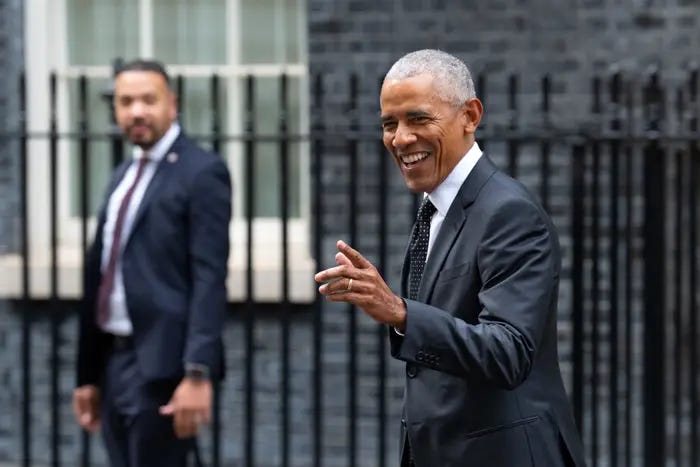
Obama the drone warfare king and founder of ISIS comes to Downing Street for a "cuppa" and to discuss AI for an hour with Rishi Sunak. Ok then.
My first report is to cover the context surrounding the Crocus terrorist attacks, ISIS or not. I do have a little something at the end that nobody else has reported on to my knowledge so do stay tuned. Watch the full news at UK Column.
One of the articles I read yesterday that I thought was really concise and accurate was by Drago Bosnic for Global Research. I particularly liked his reference to the insidious use of video gaming to hypnotise people into believing the Western fictitious narratives:
It's only a matter of time before the political West launches its own propaganda campaign that Moscow conducted a supposed "false flag".
This accomplishes at least two important goals. First, it shows that the US can supposedly "predict events" (when the truth is that it actually engineers them), and two, it creates the illusion that Russia wanted to initiate a wider conflict with the said "false flag".
However, what many keep forgetting is that the US-led political West has a propensity for projection, especially through mass media such as movies, TV series and video games, all very effective ways to influence the masses and public opinion.
Namely, video gamers surely remember the hugely popular Call of Duty series, specifically its Modern Warfare 2 iteration, published in 2009.
For those who don't know, there is a particularly disturbing level in it called "No Russian".
In short, it boils down to a "Russian ultranationalist" group storming the Domodedovo airport in Moscow, killing hundreds of civilians in the process. In-game, this was later used as an excuse by Russia to attack the entire NATO.
Interestingly, the main protagonist in the aforementioned level is a CIA agent named Joseph Allen. His goal was to infiltrate the "Russian ultranationalist group" that launched the false flag.
So, what does this have to do with current events? Well, it's quite clear that NATO's strategic planners have a tendency to project events through mass media years or decades in advance. And it should be noted that the entire Modern Warfare segment of the Call of Duty franchise goes even further.
Back in 2019, the already overtly Russophobic Modern Warfare was rebooted specifically to present the Russians in an even worse light. The Pentagon insisted that Moscow, particularly its soldiers, are shown in a dehumanizing manner.
To that end, it even pinned American war crimes on Russia.
Namely, the first part of the reboot recreated the so-called "Highway of Death", an American war crime committed in Iraq during the (First) Gulf War and shamelessly presented it as a fictional "Russian war crime in Syria".
It should be noted that the first part of the reboot was released back in 2019, which was three years before the SMO. Either way, it's perfectly clear that the political West's endgame is to not only dehumanize the Russian people and manufacture hatred toward them through mass media, but to also shape the narrative and public opinions with preplanned events, often years or decades in advance.
Kirby doing his best "nothing to do with us" performance…
My second report covers the bizarre and distinctly uncharacteristic abstention from the US during the vote for a (non-binding) temporary cease-fire while Zionist forces run sadistically amok in Gaza, assassinating for fun, burying bodies on the beach and bombing the starving civilians as they wait hopelessly for any trickle of aid - preferably not from the sky or dropped in the sea as that has also claimed lives in a cynical and cruel twist of the US pro-Zionist policy.
My tweet today expressed my feelings (not having a good day) about this particular and horrific video that was published after the news yesterday:
Horrifying footage aired by Al-Jazeera shows the Israeli army's cold blooded execution of two unarmed Palestinians on Al-Rashid Street, Gaza City, trying to head further north.
Despite the fact that they were unarmed, waving flags and raising their hands to show signs of surrender, the soldiers murdered them after deceiving them into thinking it was safe to pass.
Then, they bulldozed over their bodies in an attempt to cover up their crimes.
My tweet reads:
So Zionist/ISIS settlers are planning beach front real estate built on genocide & slain Palestinian corpses? Oh wait - they already live on land soaked in Palestinian blood - for a century. Get this cancer out of this world. It is a contagion of evil.
The video:
Finally, Syria is again rocked by more than 60 missiles from Israeli warplanes and drones in the north-east in the countryside of Deir Ez-Zor but also targeting the city itself. Israeli jets used the airspace of the US illegal Al Tanf base to bomb Syria - I mention that the US was the main protagonist but recent information received today confirmed it was Israel alone, although in compliance with the US.
And finally, here is the full news embedded:
****
Please do consider subscribing to my work on Substack. Everything I do is only possible due to your support and donations which a hugely appreciated. x

